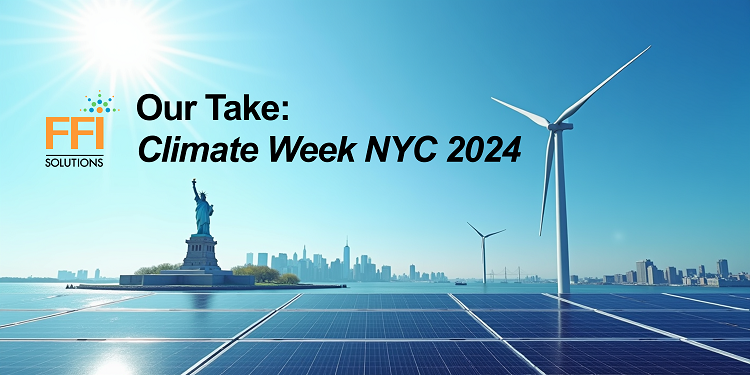
Climate Week NYC 2024 was bigger than ever. We hosted our own event with PKF O’Connor Davies on the energy transition. Our CEO, Chris Ito conducted a fireside chat with Mark Campanale of Carbon Tracker which led to an engaging back and forth discussion on the speed and scale of the energy transition. With hundreds of events to choose from, the FFI Solutions team attended a wide range of events that addressed today’s climate issues through the lens of mainstream asset owners, impact investors, rating agencies, stock exchanges, data providers, think tanks and not for profits.
Here’s our snapshot of the week’s takeaways and highlights as we look to connect the dots and perspectives of various stakeholders.
1. The Funding Gap
Just about every discussion we attended focused on the funding gap between investments necessary to decarbonize and the capital being deployed. Public-private partnerships were considered crucial, and the US Department of Energy is doing its part to enable, or de-risk, investment opportunities making them more attractive for private capital. But challenges remain, especially as it relates to the global south, where sovereign, currency and time horizon risks continue to be barriers to capital allocation.
2. The Evolution of Climate Risk Modeling
Climate risk modeling is becoming more sophisticated and integrated into financial decision-making. The FIASI event highlighted the challenges and advancements in climate risk assessment, emphasizing the need for model users to define their use cases and to select models that are fit for a given purpose.
3. Grid Modernization as a Lynchpin
The critical importance of modernizing power grids was emphasized in several sessions. There was broad recognition that grid upgrades are essential for both decarbonization and economic growth, positioning it as perhaps the most consequential investment of the decade. Bottom line – our economy can only grow (and decarbonize) as fast as the grid.
4. The Speed of the Transition
Grid modernization was also a theme at our own event featuring Carbon Tracker’s Mark Campanale. Mark impressed that the pace and scale of the transition away from fossil fuels should not be underestimated. The cost curves of solar and wind generation, EV adoption rates in China and some European countries, and historical financial performance of fossil fuel companies during periods of falling demand for their products all suggest that the transition risk to energy sector incumbents is increasing. However, there was broad acknowledgement among the many mainstream investors and analysts with whom we spoke that natural gas will be a significant and growing part of the energy mix for decades to come.
5. Challenges in Carbon Markets and Nature-Based Solutions
Despite ongoing challenges in carbon markets, including issues with standards and quality, nature-based solutions remain a key focus. Discussions at ICE’s “Carbonomics 2024” event emphasized that markets are maturing, and investors must push forward despite imperfections. There was a strong call to action for impact investors to engage with these markets to support environmental services and carbon credits.
6. Financial Impacts of Climate Risk and Transition
The financial impact of climate risk on sectors like insurance, real estate, and utilities was a key topic, with discussions on how these industries are adapting. Climate change is already impacting credit, and contrary to some opinions, the rating agencies are integrating sector specific considerations into their evaluations. There was broad agreement that the financial sector must integrate climate risks into decision-making processes more rigorously.
7. AI: Double-Edged Sword in Climate Solutions
Artificial Intelligence emerged as both a powerful tool and a potential challenge in addressing climate change. At S&P Global’s event, a panel discussion showcased how AI is being leveraged to optimize energy systems, improve climate risk assessments, and drive innovation in sustainable technologies. However, concerns were raised about AI’s substantial energy requirements. The growing demand for AI computing power could potentially offset some of the energy savings and emissions reductions it enables, highlighting the need for more energy-efficient AI systems and clean energy sources to power them.
Climate Week NYC 2024 served as a vivid reminder of the complexities and opportunities within the climate finance landscape. Reports indicated that over 100,000 people came into town for Climate Week. Great news, right? Well maybe not. Climate Week – and to some extent – COPs, risk turning into echo chambers dominated by impact and sustainable investors preaching to the choir. We made a point to venture out and engage with mainstream investors and security analysts who view climate issues through a financial lens. Their outlook on the transition to a low-carbon economy is not as optimistic.
We don’t expect, nor should anyone else, that every institutional investor will embrace impact investing and deploy their capital toward climate change mitigation. But rather, we do believe that every institutional investor should consider and act on the financial implications of physical and transition risks as climate change continues to unfold. By exploring these risks, mainstream investors can better understand the systemic threats posed by climate change – and perhaps be motivated to take action.

